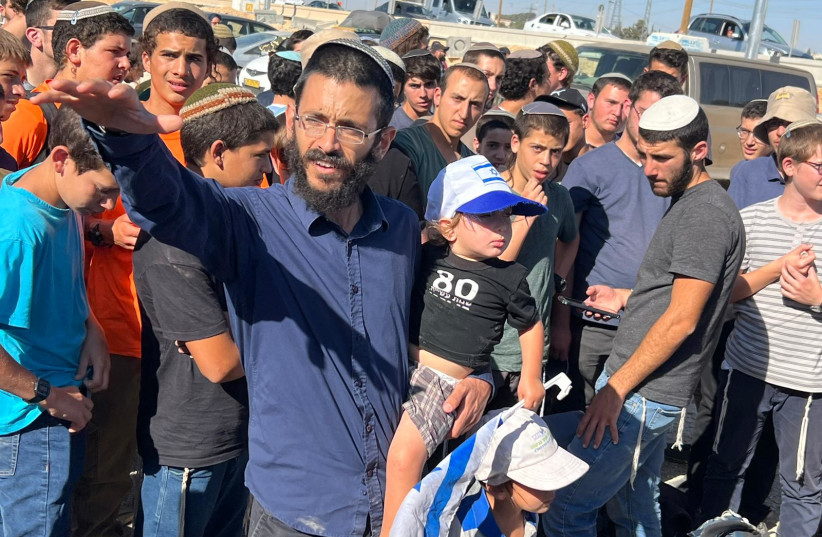Thousands of right-wing activists took to the West Bank hilltops on Wednesday, setting up illegal encampments in six locations that they want the government to authorize as new settlements.
“The people of Israel have returned to their land,” Zvi Elimelech Sharbaf told several hundred activists who gathered at the Gush Etzion junction prior to heading to one of the six encampment sites.
Sharbaf, along with veteran setter leader Daniella Weiss, co-chairs the Nahala Settlement Movement, which spearheaded the initiative, the largest civil disobedience in years that seeks to expand Israel’s landholding in Area C of the West Bank.
Prior to the event, the IDF and the police warned the activists that the campaign was illegal. The heavy security presence on the roads delayed, but did not prevent, the activists from reaching their destination. The event was still ongoing as of press time, and there was speculation that security forces would evacuate the encampments overnight.
The IDF and police issued a joint statement on Wednesday night explaining that the encampment areas were now a closed military zone.
IDF and Police respond
“Security forces are working to prevent the creation of illegal outposts and to preserve law and order,” the IDF and police said in a statement.
Activists had initially hoped to arrive at only three locations, but expanded to six. Teenagers arrived with backpacks, and entire families came with sleeping bags.
One such encampment was on a hilltop off Route 60, just opposite the road from Kiryat Arba next to Hebron.
"Security forces are working to prevent the creation of illegal outposts and to preserve law and order."
Israel Defense Forces
Under the watchful eyes of security forces, settlers and right-wing activists parked their cars at the Yellow gas station, where the lot was so crowded that vehicles were double-parked.

Activists and their encampments
They then hiked across the road and set up tents. One vehicle arrived with foam mattresses and an olive-green tarp on top of the car. Mothers had their young children in baby carriages; one teen had a silver pot tied to his knapsack.
Activists had set off from a number of central locations in the Samaria and Binyamin regions, as well as from the Gush Etzion junction. At that location, they sang, prayed and listened to a number of inspirational speeches, including from Sharbaf, the grandson of Rabbi Moshe Levinger, credited with creating the Kiryat Arba settlement 50 years ago.
The push to create encampment points, which would then become outposts and eventually settlements, came just one week after US President Joe Biden visited Israel and spoke about a two-state vision.
He did not initiate a peace process. Despite that, Israel’s pledge during the week of his visit – which was to authorize six zoning planes for Palestinian development – was seen as a sign on the Right that the government led by Prime Minister Yair Lapid plans to create a Palestinian state.
The bulk of the criticism, however, has been leveled at Defense Minister Benny Gantz, who is now in the US.
Wednesday’s protest comes at the start of the election campaign, in which Gantz has attempted to position himself as the leader of the Right against Likud party leader and former prime minister Benjamin Netanyahu.
Otzma Yehudit Party leader MK Itamar Ben-Gvir, who met with a group of activists in Barkan, said that Gantz is in favor of “advancing a Palestinian state. Gantz is representing the interests of the Palestinians instead of the interests of the State of Israel.”
At issue for the Right and those who participated in the event was also the rate of illegal Palestinian construction, which they said was part of a push to preserve Area C for inclusion within the final borders of a Palestinian state. All the encampment points were located near this sort of Palestinian buildings.
In some cases, these points, which are on state land, can be authorized as settlements already today, Sharbaf said.
Left-wing activists who believe that Israel should remove the settlements and withdraw to the pre-1967 lines also headed to the West Bank on Wednesday to voice their frustration at the Nahala initiative.
“The intention of a group of lawbreakers to build illegal outposts in Judea and Samaria harms the ability of the Israeli police and the army to their joint security mission of protecting Israel citizens,” said Public Safety Minister Omer Bar Lev.